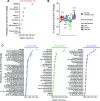The intestinal microbiota predicts COVID-19 severity and fatality regardless of hospital feeding method
- PMID: 37548476
- PMCID: PMC10469851
- DOI: 10.1128/msystems.00310-23
The intestinal microbiota predicts COVID-19 severity and fatality regardless of hospital feeding method
Abstract
SARS-CoV-2-positive patients exhibit gut and oral microbiome dysbiosis, which is associated with various aspects of COVID-19 disease (1-4). Here, we aim to identify gut and oral microbiome markers that predict COVID-19 severity in hospitalized patients, specifically severely ill patients compared to moderately ill ones. Moreover, we investigate whether hospital feeding (solid versus enteral), an important cofounder, influences the microbial composition of hospitalized COVID-19 patients. We used random forest classification machine learning models with interpretable secondary analyses. The gut, but not the oral microbiota, was a robust predictor of both COVID-19-related fatality and severity of hospitalized patients, with a higher predictive value than most clinical variables. In addition, perturbations of the gut microbiota due to enteral feeding did not associate with species that were predictive of COVID-19 severity. IMPORTANCE SARS-CoV-2 infection leads to wide-ranging, systemic symptoms with sometimes unpredictable morbidity and mortality. It is increasingly clear that the human microbiome plays an important role in how individuals respond to viral infections. Our study adds to important literature about the associations of gut microbiota and severe COVID-19 illness during the early phase of the pandemic before the availability of vaccines. Increased understanding of the interplay between microbiota and SARS-CoV-2 may lead to innovations in diagnostics, therapies, and clinical predictions.
Keywords: COVID-19; diet; enteral feeding; fatality; microbiota; predictors; random forest classification; severity.
Conflict of interest statement
The authors declare no conflict of interest.
Figures


References
-
- Yeoh YK, Zuo T, Lui G-Y, Zhang F, Liu Q, Li AY, Chung AC, Cheung CP, Tso EY, Fung KS, Chan V, Ling L, Joynt G, Hui D-C, Chow KM, Ng SSS, Li T-M, Ng RW, Yip TC, Wong G-H, Chan FK, Wong CK, Chan PK, Ng SC. 2021. Gut microbiota composition reflects disease severity and dysfunctional immune responses in patients with COVID-19. Gut 70:698–706. doi: 10.1136/gutjnl-2020-323020 - DOI - PMC - PubMed
-
- Wanglong G, Yuanqing F, Liang Y, Chen G, Cai X, Shuai M, Xu F, Yi X, Chen H, Zhu Y, Xiao M, Jiang Z, Miao Z, Xiao C, Shen B, Wu X, Zhao H, Ling W, Jun W, Yu-ming C, Tiannan G, Ju-Sheng Z. 2021. Gut microbiota, inflammation, and molecular signatures of host response to infection. J Genet Genomics 48:792–802. doi: 10.1016/j.jgg.2021.04.002 - DOI - PubMed
-
- Zuo T, Zhang F, Lui GCY, Yeoh YK, Li AYL, Zhan H, Wan Y, Chung ACK, Cheung CP, Chen N, Lai CKC, Chen Z, Tso EYK, Fung KSC, Chan V, Ling L, Joynt G, Hui DSC, Chan FKL, Chan PKS, Ng SC. 2020. Alterations in gut microbiota of patients with COVID-19 during time of hospitalization. Gastroenterology 159:944–955. doi: 10.1053/j.gastro.2020.05.048 - DOI - PMC - PubMed
Publication types
MeSH terms
Grants and funding
LinkOut - more resources
Full Text Sources
Medical
Miscellaneous
